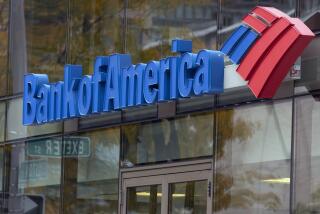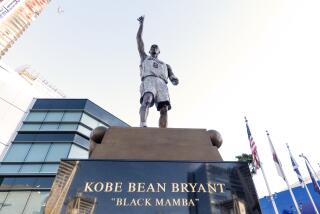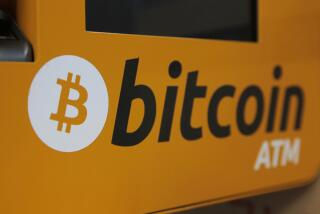No Accounting for the ATM Typo
- Share via
Question: I know that you’ve written a lot about the Automated Teller Machines (ATMs), which have become so popular with banks in recent years, and I wonder if you have run across any instances of one of them making a typographical error.
This sounds like an odd question, but it’s the only explanation I can think of that makes any sense in what happened to me recently. Being between paydays and needing about $80 to run me over the weekend, I went to my nearest ATM. I knew I didn’t have a really fat balance, but my records indicated that I had about $200 and that an $80 withdrawal shouldn’t present any problem.
Imagine my horror, though, when I got my $80, all right, but the “Available Balance” showing on the card indicated that I’d left myself with only $5.95. My first reaction was that (once again) I’d made a withdrawal somewhere down the road and had forgotten to enter it in my book. But with my next payday still almost a week away, $5.95 wasn’t going to cover even my checking charges. Also, there was a $30 check, written a few days earlier, that might not have cleared, and if I really had only $5.95 in that account, I’d be in trouble.
I didn’t want to take any chances, so my wife obligingly wrote me a check for $75 the next day (a Friday), and I took it directly to my bank and deposited it in the Express box in the lobby. The $75, plus the $5.95 balance, I figured, should cover that stray check (if, indeed, it hadn’t cleared) and any check charges as well. Also, a double-check of my records indicated that I hadn’t neglected to enter an earlier withdrawal.
Dropped Digits?
The following Monday I went to the ATM again and checked my balance. I should’ve shown a balance of about $80, right? Wrong! I had a balance of about $152! Now, how in the world could I have deposited $75 into an account with only $5.95 in it and ended up with a balance of $152 unless that original $5.95 “available balance” was a typo? It looks to me as if a couple of digits got dropped. It’s no big deal--I didn’t lose anything. But it sure startled me for a while. Have you ever heard of one of these things misprinting like that?--C.G.
Answer: When the Automated Teller Machines hit the market here in a big way about three or four years ago, they opened up a whole new world of convenience--and, in their wake, a whole new world of screwed-up checkbooks too.
The most common failing: forgetting to enter these cash withdrawals in your checkbook as soon as they’re made. That was your first and most logical conclusion, because finding a smaller balance than you had expected to find is so commonplace with some of us that it doesn’t even deserve comment.
“A lot of people too,” one local banker said, “don’t take into account the fact that entering a deposit doesn’t make it immediately available. It has to be visually verified. And, in the case of an out-of-town check, there may be a ‘hold’ on it for several days. Every once in a while, we even find an ATM with loose cash in it--the customer apparently thinks there’s somebody in there to receive it and credit it to the right account.”
Also a common cause of screwed-up checkbooks: hitting an inaccurate deposit figure on the ATM and then entering that in your checkbook. “The ATM,” the local banker added, “simply gives you a receipt for what you punch in--right or wrong.”
Another: failing to take into account the fact that outstanding checks can float around for an unconscionable length of time before hitting home and sending that old available balance into a sudden and precipitous tailspin.
All of which doesn’t help much in explaining what happened to you if everything is indeed as you outline it--that you didn’t have any recent deposits that might not have cleared yet, that all previous ATM withdrawals had been accounted for and that only one check could still be floating around. How did $75 and $5.95 add up to $152--everything else being even?
“We’ve never run across anything like this,” our local banker said guardedly. “That’s not to say, I suppose, that something strange couldn’t have happened, but . . . .”
Possibility a New One
The possibility of an ATM typographical error is also a new one for Tom Bartoo, a public relations spokesman for Canton, Ohio-based Diebold Inc., the country’s leading manufacturer of ATMs. “It’s the first question of its kind that we’ve had.”
Anything that is automated--including an ATM--has one overriding characteristic, Bartoo adds. “It does the same thing, the same way, every time--unless there’s been a change in the software or there’s been an electrical outage or something like that--all of which can and does happen.”
In other words, an isolated, one-time malfunction like this would be extremely unusual--there should have been a whole batch of similar errors at about the same time.
And, as Bartoo correctly points out: “The reliability of the ATM, industrywide, is rated superior. In terms of performance, we’re running well above 99%.” And, in all fairness, anyone who has been using ATMs locally for the past few years can remember all too clearly how frequently they used to be out of order in the first year--and how rarely they are today. “Under normal circumstances,” the Diebold spokesman continues, “the ATM will give you a balance that is accurate at that moment but, ironically, may not be the true balance at all because of these time lags--deposits that haven’t cleared and checks that haven’t turned up for payment.
“Still and all,” Bartoo adds, “every ATM is a computer that is under the control of a bigger computer somewhere, and anyone who says the whole thing is infallible is dead wrong.”
So there it stands: Bartoo has noted the sequence of events as they happened to you and will check with Diebold’s engineers on what might have happened to account for what now seems to be the sort of typographical error that you and I so frequently make.
Stay tuned.
Q: A member of our family died, living only a few days into the year. He wasn’t married and had no large personal holdings other than a large personal work bonus coming after his death--and a car.
The Internal Revenue Service has sent a large bill to him (the deceased), and my question is who should pay, and why? They are also adding penalties each day the bill isn’t paid.--A.R.
A: Your relative obviously died intestate--without having made a will--which means that the state splits up the estate by formula, and any liabilities against it are handled in the same order. The formula may vary slightly from state to state, but in California, a spokesman for the state said any intestate estate goes automatically to a spouse, if there is one. Or, if none (which is your relative’s situation), in equal parts to surviving children (also not applicable in his case). In the absence of spouse or offspring, the estate is split equally among brothers and sisters.
By now, however, you should be aware of how much (if any) of this relative’s estate has dribbled down to you--and to the other brothers and sisters, if that’s what you are.
Just what sort of claim the Internal Revenue Service has against this relative’s estate is anybody’s guess, but it’s highly unlikely that it is dunning anybody for federal inheritance tax because the threshold here is $400,000, and the estate clearly wasn’t that large. So, an IRS spokesman guessed that it is probably a claim against either his last year’s return or what he owed this year, the year of his death.
If it’s a valid claim, then the survivors owe the money.
More to Read
Inside the business of entertainment
The Wide Shot brings you news, analysis and insights on everything from streaming wars to production — and what it all means for the future.
You may occasionally receive promotional content from the Los Angeles Times.









